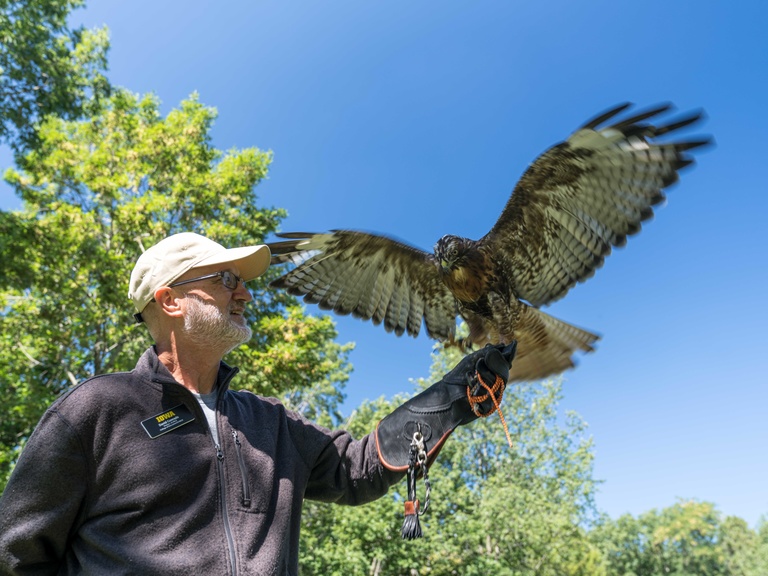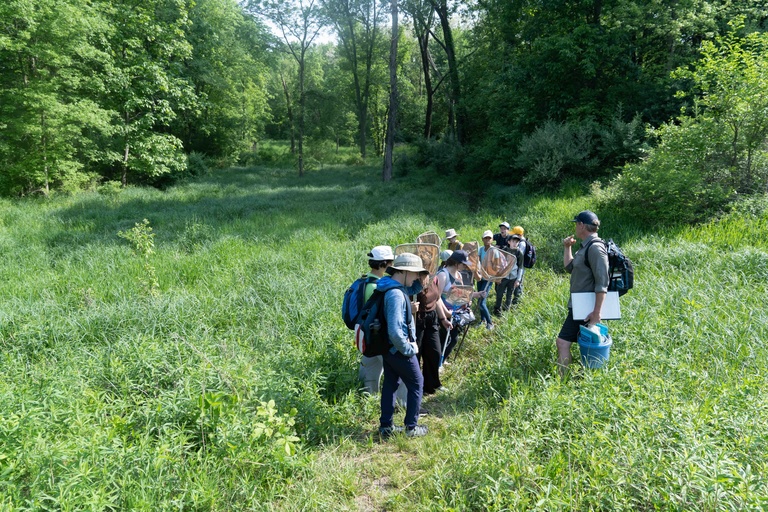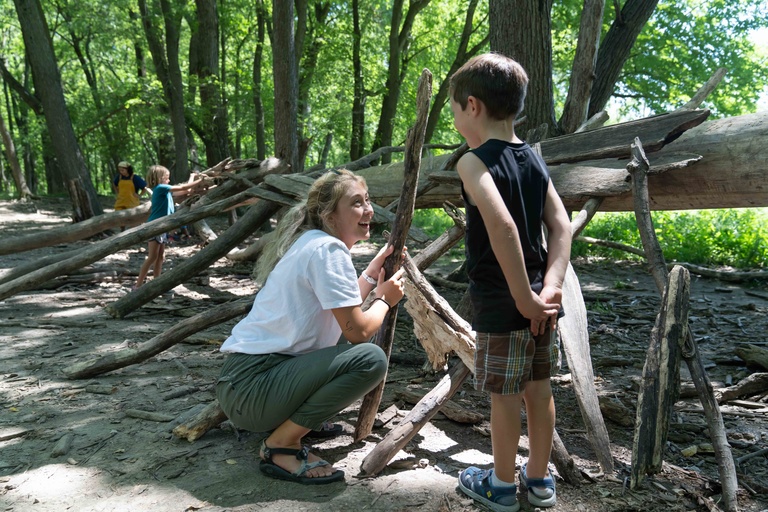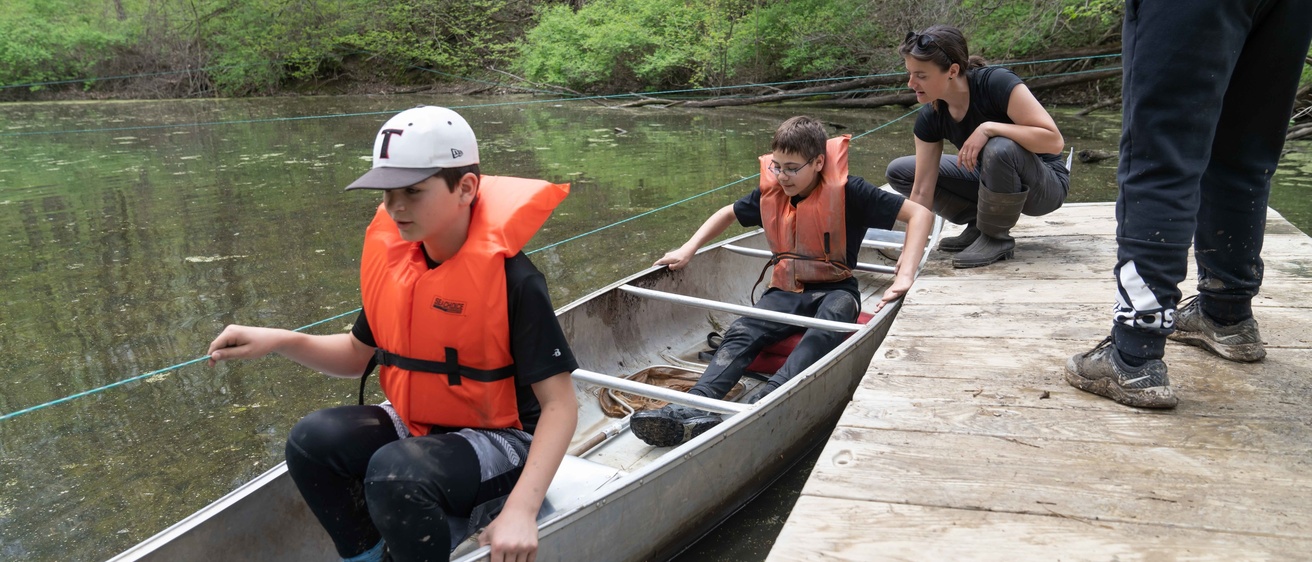In an increasingly online world, there are still some experiences technology cannot replicate. For decades, UI WILD (Wildlife Instruction and Leadership Development) has been bringing students into nature for hands-on learning experience with the programs School of the Wild, Iowa Wildlife Camps, and the Iowa Raptor Project.
UI WILD Director Dave Conrads says hands-on experience as an undergraduate student is what sparked his interest in the natural world and prompted him to go into field biology
“I wanted to give children the very thing I didn't get as a child and that's a lot of firsthand experience with the wild.”
Conrads took over the Iowa Raptor Project – the first of the three programs – in 1990. In 1991, he started the Iowa Wildlife Camps. Conrads realized many of the Iowa Wildlife Campers were economically privileged, and he wanted to make the week-long experience accessible to students of all backgrounds. Thus, School of the Wild was born in 1998, which brought the wilderness experience to all 6th graders in the Iowa City Community School District.
“Students just needed to be awakened to what is out there. One of the things we talk about is awakening awareness, then nurturing appreciation, and inspiring action. We want them to grow up to be citizens who care for the wild that's still left here in Iowa.”
Dave Conrads

Conrads says it’s especially important for Iowa children to learn about stewardship of the land because the state has the most altered landscape in the nation. Less than 0.1% of Iowa’s original prairie remains today.
In recent years, School of the Wild has partnered with community schools and county conservation professionals in 36 counties across the state to make learning in nature accessible to all Iowans.
Next year, the Cedar Falls Community School District wants all seven of its elementary schools to participate. That partnership is especially personal to Conrads because he grew up in that area without having access to learning experiences in nature.
“We're working with the Black Hawk County Conservation Board and we’re going to be providing School of Wild at Hartman Reserve Nature Center. And for me, that's going home. That's pretty exciting.”
Conrads says the School of the Wild is many children’s first introduction to the University of Iowa as an institution. UI WILD hopes to continue partnering across the state so students in every county can spend a week with School of the Wild.
In fact, School of the Wild Director Jay Gorsh (PhD, '19) says there are plans to expand the program to other states, based on strong interest from other schools and community partners.
"We are thrilled there is interest to scale this educational model to other areas across the country so more students and teachers can benefit from teaching and learning in nature since it enriches learning in multiple subject areas," says Gorsh.
While outdoor education is often associated with science, Conrads says language arts, social studies, math and fine arts are all part of the curriculum.
“Conservation education is not only science, it's not only STEM. It's a multidisciplinary effort to connect kids to the wild,” Conrads says.
Throughout the week, the children are encouraged to slow down and enjoy being in nature. In one of the School of the Wild activities, students are instructed to close their eyes and imagine themselves as a tree as part of a mindfulness practice.

“An activity like this can allow kids to gain in self-confidence and center themselves and learn some techniques that they can take with them throughout their day and even back to school to ground themselves,” says Counseling Psychology Professor Julie Koch.
Koch says through a Scanlan Center for School Mental Health grant, a graduate assistant will help model that activity for teachers and assist them in implementing it.
Studies have found that increased time in nature and interacting with wildlife improves mental wellbeing and cognitive functioning.
The wild environment can be a helpful change in setting for kids.
“Students who struggle in the classroom – and we're even warned about them, ‘Oh, they're going to be a challenge’ – frequently they end up being leaders out there,” Conrads says. “So often one of the issues in the classroom might be that it just doesn’t fit their learning style.”
Conrads has heard students reflect with surprise that they learned while having fun with UI WILD.
“They're not used to that, and here it just happens naturally. No pun intended.”
Though UI WILD joined the College of Education in August 2021, future educators have been involved with the programs for many years. However, joining the College of Education has created more opportunities for future teachers.
Since joining the College of Education in August of 2021, UI WILD furthered its commitment to providing future educators with teaching opportunities through the programs.
At the Iowa Raptor Project, College of Education students have the unique opportunity to work with birds of prey to tell educational stories.
Every elementary education major comes through the School of the Wild at least twice for the science methods courses. Students can also earn their student teaching credit through School of the Wild.
Several instructors at the Iowa Wildlife Camps are also students in the College of Education. In their work as instructors, education students learn how to teach in the outdoors and develop skills, including curriculum development, management training, and instruction, says Conrads.

Rubye Ney, an elementary education student from Wellman, Iowa, graduating in December 2023, is one of those instructors.
Ney hadn’t considered the possibilities of outdoor education before being introduced to UI WILD through the science methods courses, and she wanted to dive deeper. She signed up to work at Iowa Wildlife Camps for the summer of 2022, and returned for the summer of 2023 after working part time as a substitute teacher at School of the Wild during the school year.
Ney says her teaching experience at Iowa Wildlife Camps and School of the Wild has challenged her to take a step back and allow the students to direct their learning.
“Instead of being a leader, I serve as a facilitator and supporter of question-asking and investigating nature, or other things that we see along the way,” she says.
The wild also facilitates an environment for kids to learn more about themselves. One activity directs students to move around a pond in canoes by using ropes that form a web over the water.
“Almost every week there's a student who is a little unsure at the beginning about getting in that canoe, but I think that through and because of School of the Wild, they have the opportunity to really push their own limits and see just how brave they can be and overcome some fears,” Ney says.
Through working in nature and incorporating the outdoor space into education, youth create a more impactful relationship with the wild that stays with them beyond their experience with UI WILD, Ney says.
“Every student or camper who comes through UI WILD leaves with a better land ethic than when they came in. It can be hard to sit kids down in the classroom, and say, ‘You should care about our prairies, you should care about the falcon populations,’” Ney says. “But when you put them in an outdoor setting where they see the falcons at the Iowa Raptor Project, or they can interact with the wetlands and prairies and really take that experience in, then they leave caring a lot more about being good stewards of the Earth.”
Your support matters. To give, please visit givetoiowa.org/2024ED99.
